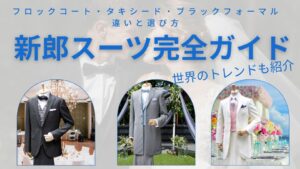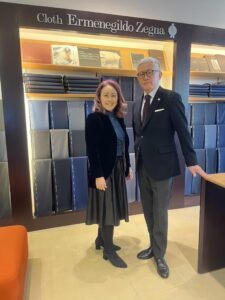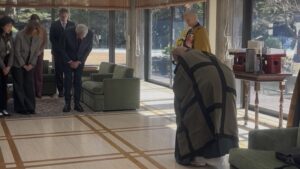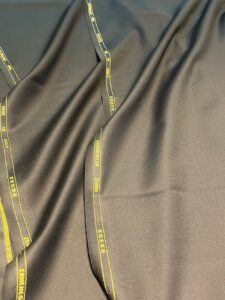Day 2|創業者・北川康信の哲学──“良いスーツは、働く人の人生を支える”
株式会社東京ジョンフォードの創業者・北川康信が、総合アパレルメーカーで8年のキャリアを終えて、紳士服の世界に飛び込んだのは、30歳のとき。
当時の日本はバブル経済を迎える少し前──
“モーレツサラリーマン”と呼ばれた人々が週6日勤務で日本経済を支えていた時代です。
長時間労働が当たり前で、日々の生活は慌ただしい。
そんな時代に、スーツはまさに“戦うための鎧”でした。
しかし、日々身を削って働く会社員にとって、
「スーツを選ぶための時間を確保すること」ですら、負担そのものでした。
👉 銀座ヴェスタでスーツの相談をしてみる “自分のための一着”を作り始めるなら今。ご予約はこちらから。お電話:03−3562−0362 (営業時間内対応:火曜定休) お電話や、VESTA公式Line, Instagram のDMでご相談ください。
● 大企業の会議室や売店での訪問販売──働く人の時間を守るために
北川康信はこう考えました。
“忙しいサラリーマンの時間を奪わず、必要な一着だけを誠実に届けたい。”
その想いから始めたのが、
大企業の会議室や売店スペースを借りてオーダーを受ける、訪問販売形式のビジネスでした。
今ではたくさんの量販オーダースーツ会社が行うこの販売形態ですが、当時としては革新的で、働く人にとって現実的で助かるサービス。
訪れた企業は、
一部上場企業、総合商社、メガバンク、証券会社──
名だたる企業ばかりで、数えきれないビジネスパーソンが東京ジョンフォードのスーツを手にし、仕事の現場で愛用して下さいました。
北川が届けていたのは単なるスーツではありません。
“時間を奪わない誠実なサービス”という、目に見えない価値でもありました。
● 時代の変化──スーツを「楽しむ」文化が芽生えた2000年代
しかし時代は移り変わり、2000年代へ。
日本企業にはワークライフバランスの概念が浸透し始め、人々の価値観にも変化が訪れます。
スーツは仕事道具であると同時に、
“自分のパーソナルスタイルを表現するアイテム”としての役割を求められるようになりました。
- 家族と一緒に選ぶ
- 恋人やパートナーと楽しみながら仕立てる
- 自分のペースでじっくり選ぶ
そんな “スーツを楽しむ” 文化の始まりを、
北川は敏感に感じ取っていました。
👉 銀座ヴェスタでスーツの相談をしてみる “自分のための一着”を作り始めるなら今。ご予約はこちらから。お電話:03−3562−0362 (営業時間内対応:火曜定休) お電話や、VESTA公式Line, Instagram のDMでご相談ください。
● イタリアと英国の工房を巡る──未来のスーツを探す旅
時代が変わるなら、スーツの形も進化すべき。
そう考えた北川は、積極的に海外へ渡航し始めます。
訪れた場所は多岐にわたり、
ロンドンの名門テーラー、
イタリアのデザイナーズブランド、
老舗ファブリックメーカー、
南イタリアの小さな職人工房、
さらに資材メーカーから縫製現場まで──
訪問数は40箇所を優に超えました。
なぜそこまでしたのか。
「これからの東京ジョンフォードにふさわしい一着とは何か」
「お客様にとって最高のスーツをどう届けるべきか」
その答えを探すためです。
北川の原点にあるのは数学。
大学では数学科を専攻していた北川康信は、イタリア職人の感性に感銘を受けるとともに、この感性を“数値化して形にする”工程を実現できないだろうかと、当時の東京ジョンフォードにいたベテラン技術者たちと研究を重ねました。
その結果、
イタリアの美意識と日本の精緻なものづくりを融合させた、
独自の副資材と縫製工程の開発へとつながっていきます。
これこそ、現在のVESTAのスーツを支える揺るぎない土台 となりました。
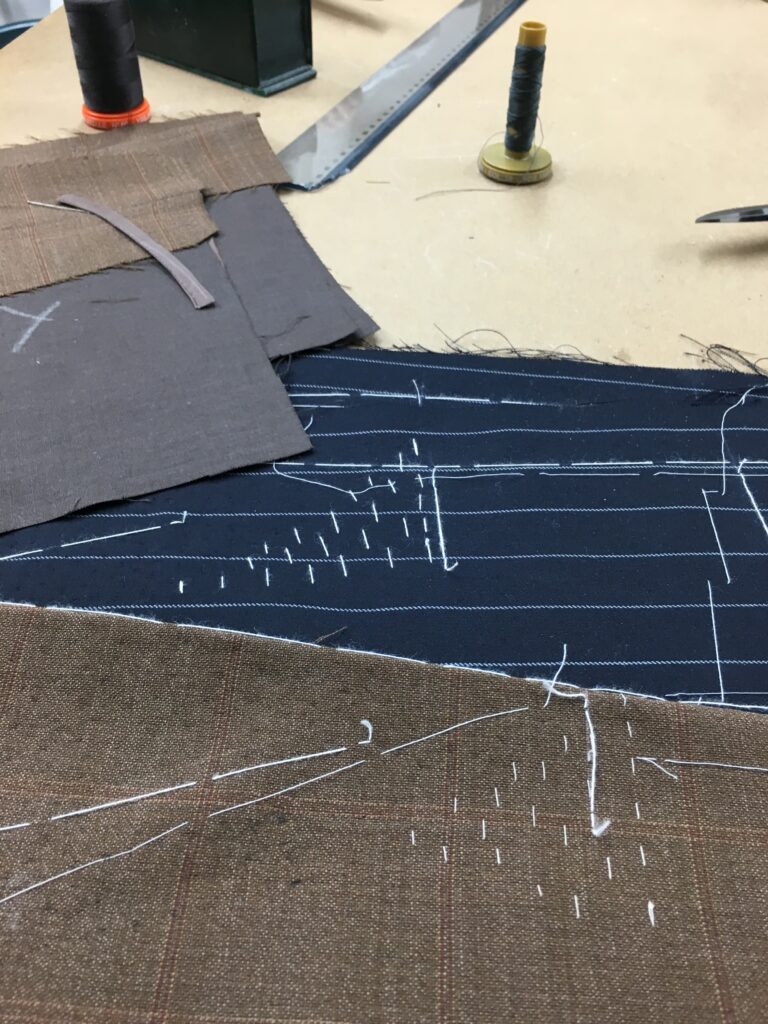
● 今日へと受け継がれる創業者の信念
2つの時代をまたいで、北川康信が大切にしてきた言葉があります。
“良いスーツは、人の人生を変える。”
忙しいサラリーマンを支えるために始まった東京ジョンフォード。
そして、人生の節目や喜びをともに楽しむサロンへ進化したVESTA。
その背景には常に、
“お客様の人生の変化に寄り添う”
という創業者の哲学が流れ続けています。
次章|“ヴェスタ独自の縫製工程”誕生の物語
明日のDay 3では、創業者が40以上の工房を巡りながら磨き上げた、
「ヴェスタ独自の縫製工程」がどのように生まれたのか──
その知られざる裏側をお届けします。
Youtube動画でこのストーリーを見る
👉 銀座ヴェスタでスーツの相談をしてみる “自分のための一着”を作り始めるなら今。ご予約はこちらから。お電話:03−3562−0362 (営業時間内対応:火曜定休) お電話や、VESTA公式Line, Instagram のDMでご相談ください。
ヴェスタで行う各種フェア、イベント情報はトップページ最新情報コーナー”What’s NEW”でご覧ください
Day 2|Founder Yasunobu Kitagawa’s Philosophy — “A Good Suit Supports a Working Person’s Life”
Yasunobu Kitagawa, founder of Tokyo John Ford Co., Ltd., entered the world of menswear at the age of 30.
It was just before Japan entered its bubble economy — a time when so-called “fierce salarymen” worked six days a week and carried the nation’s growth on their shoulders.
Long working hours were the norm, and daily life moved at a relentless pace.
In such a time, a suit was truly “armor for battle.”
Yet for exhausted office workers, even finding the time to choose a suit felt like an overwhelming burden.
● Visiting Corporate Offices — A Way to Protect Clients’ Time
Kitagawa asked himself:
“How can I deliver only the suit they need, without stealing their precious time?”
The answer became a groundbreaking business model for its era:
visiting major companies and taking orders inside meeting rooms or in-house shops.
The companies he visited included:
listed corporations, major trading houses, megabanks, securities firms —
a long list of top-tier businesses where countless professionals came to know and love Tokyo John Ford’s suits.
What Kitagawa delivered was not merely a garment.
It was “a sincere service that does not take time away from the working person” — an invisible value deeply appreciated by many.
● The 2000s — When Japan Began to Enjoy Suits
As Japan entered the 2000s, work styles began to shift.
The concept of work–life balance spread, and people’s relationship with clothing changed.
Suits were no longer just tools for work.
They began to take on the role of
“a personal item that expresses one’s individuality.”
People started to:
- Choose suits with their family
- Enjoy the tailoring experience with a partner
- Take their time selecting a garment that truly felt like “them”
Kitagawa sensed this cultural shift earlier than most.
● A Journey Through Italy and the UK — Searching for the Future of Suit-Making
If the times were changing, then the suit itself should evolve.
With this belief, Kitagawa began traveling overseas.
He visited more than 40 locations including:
- Savile Row tailors in London
- Renowned Italian designer ateliers
- Historic fabric mills
- Small artisan workshops in Southern Italy
- Material suppliers and sewing factories across Europe
Why go so far?
To answer two questions:
“What kind of suit should Tokyo John Ford create from now on?”
“What is the very best suit we can offer our clients?”
Kitagawa’s foundation was mathematics — he had studied mathematics at university.
He was deeply moved by the way Italian artisans transformed intuition and sensitivity into measurable, reproducible techniques.
This ultimately led him to develop:
- Original interlinings and materials, and
- A unique sewing and construction process,
fusing Italian aesthetics with Japanese precision.
These innovations would later become
the unshakable foundation of VESTA’s suit-making philosophy.
● The Founder’s Belief That Continues Today
Across two generations of suit culture, one belief has remained constant for Yasunobu Kitagawa:
“A good suit can change a person’s life.”
Tokyo John Ford was born to support the hard-working men of Japan.
VESTA evolved into a salon where people savor significant moments of their lives through clothing.
At the core of both lies the same philosophy:
“To stay close to the lives, growth, and transitions of our clients.”
Next Chapter|The Birth of VESTA’s Unique Construction Method
In tomorrow’s Day 3 episode, we explore how visiting more than 40 ateliers, fabric mills, and artisan workshops led to the creation of
VESTA’s original tailoring and construction method —
the hidden story behind the suit that represents the highest craftsmanship in Ginza today.
Day 2|Founder Yasunobu Kitagawa’s Philosophy — “A Good Suit Supports a Working Person’s Life”
Yasunobu Kitagawa, founder of Tokyo John Ford Co., Ltd., entered the world of menswear at the age of 30.
It was just before Japan entered its bubble economy — a time when so-called “fierce salarymen” worked six days a week and carried the nation’s growth on their shoulders.
Long working hours were the norm, and daily life moved at a relentless pace.
In such a time, a suit was truly “armor for battle.”
Yet for exhausted office workers, even finding the time to choose a suit felt like an overwhelming burden.
● Visiting Corporate Offices — A Way to Protect Clients’ Time
Kitagawa asked himself:
“How can I deliver only the suit they need, without stealing their precious time?”
The answer became a groundbreaking business model for its era:
visiting major companies and taking orders inside meeting rooms or in-house shops.
The companies he visited included:
listed corporations, major trading houses, megabanks, securities firms —
a long list of top-tier businesses where countless professionals came to know and love Tokyo John Ford’s suits.
What Kitagawa delivered was not merely a garment.
It was “a sincere service that does not take time away from the working person” — an invisible value deeply appreciated by many.
👉 Consult VESTA Ginza About Your Next Suit
If you are ready to begin creating “a suit for yourself,” we welcome your inquiry.
Reservation: 03-3562-0362 (Closed Tuesdays)
You may also contact us via VESTA official LINE, Instagram DM, or by phone.
● The 2000s — When Japan Began to Enjoy Suits
As Japan entered the 2000s, work styles began to shift.
The concept of work–life balance spread, and people’s relationship with clothing changed.
Suits were no longer just tools for work.
They began to take on the role of
“a personal item that expresses one’s individuality.”
People started to:
- Choose suits with their family
- Enjoy the tailoring experience with a partner
- Take their time selecting a garment that truly felt like “them”
Kitagawa sensed this cultural shift earlier than most.
● A Journey Through Italy and the UK — Searching for the Future of Suit-Making
If the times were changing, then the suit itself should evolve.
With this belief, Kitagawa began traveling overseas.
He visited more than 40 locations including:
- Savile Row tailors in London
- Renowned Italian designer ateliers
- Historic fabric mills
- Small artisan workshops in Southern Italy
- Material suppliers and sewing factories across Europe
Why go so far?
To answer two questions:
“What kind of suit should Tokyo John Ford create from now on?”
“What is the very best suit we can offer our clients?”
Kitagawa’s foundation was mathematics — he had studied mathematics at university.
He was deeply moved by the way Italian artisans transformed intuition and sensitivity into measurable, reproducible techniques.
This ultimately led him to develop:
- Original interlinings and materials, and
- A unique sewing and construction process,
fusing Italian aesthetics with Japanese precision.
These innovations would later become
the unshakable foundation of VESTA’s suit-making philosophy.
● The Founder’s Belief That Continues Today
Across two generations of suit culture, one belief has remained constant for Yasunobu Kitagawa:
“A good suit can change a person’s life.”
Tokyo John Ford was born to support the hard-working men of Japan.
VESTA evolved into a salon where people savor significant moments of their lives through clothing.
At the core of both lies the same philosophy:
“To stay close to the lives, growth, and transitions of our clients.”
Next Chapter|The Birth of VESTA’s Unique Construction Method
In tomorrow’s Day 3 episode, we explore how visiting more than 40 ateliers, fabric mills, and artisan workshops led to the creation of
VESTA’s original tailoring and construction method —
the hidden story behind the suit that represents the highest craftsmanship in Ginza today.
👉 Book a Suit Consultation at VESTA Ginza
If you’re ready to begin creating a suit made just for you, now is the perfect time.
Make your appointment here.
Phone: 03-3562-0362
(Available during business hours; closed on Tuesdays)
You may also contact us by phone, VESTA’s official LINE, or Instagram DM for any inquiries.

